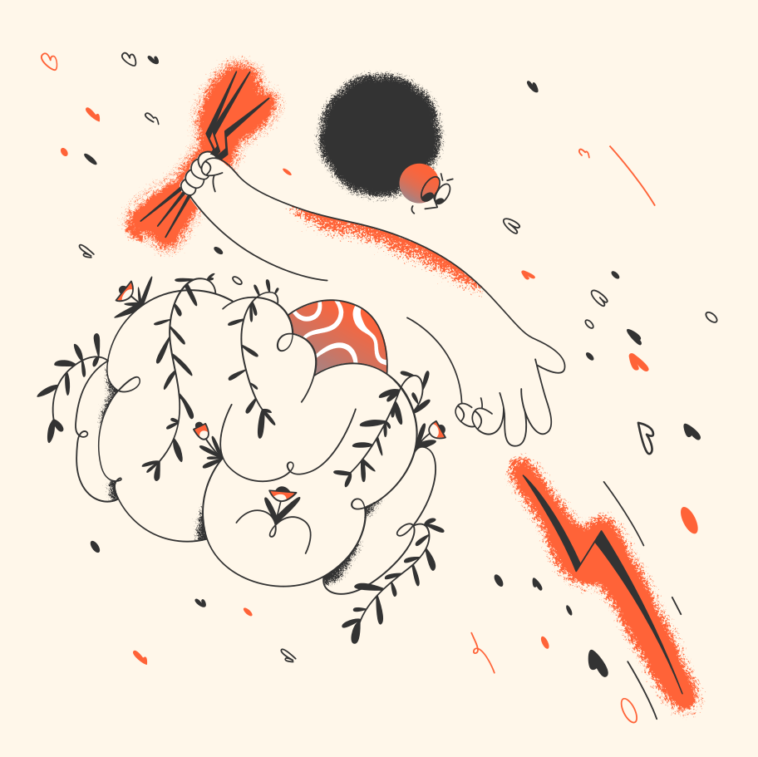h2>Dating : The Soviet Weather
What if nature and ideology clash with each other?
Image by icons8.com
On that day, they asked him to come to the office and to bring some of the weather reports.
Upon receiving the call, the weatherman rushed to his desk and smoked a cigar which he considered to be his last. In the meantime, he called his wife and said he loved her. His wife asked what was wrong, but the weatherman said there was no reason for the declaration of his love. On the other side his wife condemned his lie with a troubling silence. The weatherman did not want to make the farewell too painful and therefore repeated his declarations of love before he hung up. Then he continued smoking.
He asked himself what he had done wrong. Until now, everyone had always been satisfied with his performance. The cigar in his hands spoke volumes. He could only afford it because of his many years of service as a weatherman for the state television, which appeared on the screen all over the country at seven o’clock in the evening. His performance caused an increase in viewing figures between the patriotic six o’clock newsreel and the traditional war film about the heroic deeds of deceased countrymen around quarter past seven. From the crippled peasant to the high ranking officer, everyone gathered in front of the television when the weatherman started explaining.
It didn’t bode well that the director had called him to his office. In other countries, bosses called you to the office for various reasons. Here, offices were throne rooms where a simple man such as the weather man was almost never allowed. Compliments, pay rises and promotions, all that didn’t happen during a meeting in the office. The bosses arranged that outside of work, at one of the party congresses.
On his desk there were several letters from fans thanking him for his warm program, praising him for the good weather and forgiving him if it had been rainy during the weekend. He had always been happy with such compliments, but what were they worth now that he had to appear in the director’s office? Even if he pushed all the boxes of fan mail into the office, he wouldn’t avert his fate. He’d just walk in, get the news, and then he’d be left with the choice of how to deal with it. Nothing more. A farewell cigar wouldn’t even be given to him by the director. That’s why he smoked it here already.
The clock that hung next to the Leader’s portrait indicated that time was running out and he’d better hurry if he didn’t want to be late for his own firing. He calmly picked up some weather cards from the past few days, put them on a pile and kept them stable between his hands. Then he said farewell to his desk and stepped into the corridor.
In front of the office on the second floor, his boss was talking to two other men. Occasionally they laughed at a remark one of them made. They abruptly became silent when they saw the weatherman and invited him inside. The weatherman put his weather charts on the desk and sat down while he examined the two men. They were clearly working for the Party and were only delegated to conversations like this to intimidate. In this way, they made sure that desperate people like the weatherman didn’t make too much of a scene.
“And?”, the director asked the weatherman. “What does it look like for today?”
The weatherman took a weather chart from the pile and explained everything down to the last detail while the men pretended to be listening. Out of respect for his expertise, they let him finish before the director leaned back.
“We have a problem,” he said.
The weatherman put the reports on his lap and waited for the director to continue with his explanation. This was it then, he thought, the end of my career.
“Take a look at those weather charts,” said the director. “Can’t you see what’s wrong with them?
The weatherman didn’t see much strange. He scraped his throat, quickly went over all the meteorological figures again and then said: “Maybe it’s all a bit messy-”
“No no no.” The director moved his chair closer to the desk and put his finger on the far corner of the country to the east. “Here, for example, the rain is falling unstoppable, but if you look here-” He moved his finger to the westernmost point, “-they are bathing in sunlight, as if it were the coast of Spain”.
“Our country is very big”, said the weatherman, adding: “Thanks to our Leader”.
“Yes, absolutely, but I hope you understand it is an insult for everything we stand for, don’t you?”
“Why?”
The three men laughed at the naive remark as if they were kindergarten leaders who had to explain to their pupils why it is better not to take to the streets without pants.
“Come on, Mr. Weatherman, think!” The director shoved the weather chart under his nose once more. “The foundation of our Socialist system is simple: every human being is equal. Surely we can’t come to the people with weather reports where it’s raining here, while it’s the Cote d’Azur over there?”
“But…”He wanted to protest with his fifteen years of expertise, but with the two men of the party next to him, he managed to contain himself. “But that’s just the way it works again, isn’t it?”
“It only gets on our nerves, dear friend. The weather makes our whole ideology ridiculous. People are divided into climates. One is comfortably warm while the other is shivering because of the cold. Is that fair, then? That’s why we have to put ourselves above nature and stop this inequality”.
“Of course.” The weatherman swallowed. “But such a thing is impossible, isn’t it? We can’t quite adjust the weather anyway-”
“These are not your concerns,” said the director. “The Party knows what it’s doing. They already made the decision at Congress last week. If you’re worried, you can always read their file on it.”
The director handed the weatherman a hefty file. In it the weatherman flipped while trying to keep the shiver out of his body. During every sentence of the Party’s proposal, he had to silence his professional ethics. So he nodded enthusiastically at passages that turned his stomach. He tried not to think of the catastrophic consequences for the ecosystem in the future by focusing on the nightmare in which he currently found himself.
“Fantastic!”, he finally shouted. “It can’t be anything but a success! I will continue my role as weatherman in this new context with the greatest conviction!”
“Glad to hear that,” said the director. “But your enthusiasm makes it difficult for me to tell you this. You have to understand that you can’t stay on as a weatherman. If the weather is always the same, it would be stupid to let you tell that every night.”
The weatherman had already resigned himself to the ethical concessions he had to make if he wanted to keep his job, but since that was now also at risk, his mind switched to survival mode. Anyone who didn’t have a job and didn’t find one had to move to one of the well-known blocks where you were allocated a room of three out of three per family. And what about his daughter? She had only just started her violin studies and was enjoying it to the fullest. Although the school provided every pupil with a violin for free, it were mainly old models whose strings made it almost impossible to play purely. The weatherman had therefore bought a new one on credit from the city’s best-known music store — a purchase that he could not normally complete within three years. He couldn’t do that to her. He had to come up with something.
“Are there no other possibilities?” he asked.
“I’m sorry, Mr. Weatherman.” The director asked him for the file back and safely deposited it. “You know how it goes when a decision has been made. The group’s interests take precedence over your own”.
“I mean other possibilities for nationalizing the weather, Mr. Director.”
One of the government men seemed to wake up and asked: “What do you mean?”
“What if we just make people believe it’s nationalized again? Then our ecosystem doesn’t have to die.” The weatherman saw that the three men didn’t understand what he meant and clarified: “I just make different weather reports every day and in the areas where it rains, we broadcast the weather report that it rains all over the country, and where the sun shines, we…”
“Yes yes, we understand.”
The two government men exchanged glances and without any emotion in their faces they reached a consensus.
“Good,” said the government man. “Your idea is not that bad. In that case, we always want to present it to the Party.”
The two government men stood up straight and reached out their hands at the same time so that the weatherman didn’t know which one to shake first, especially since the answer didn’t assure him of a preserved future as a weatherman. By a main movement of the director he went over anyway and he shook hands with both of them while expressing his support for the regime. Less than a minute later they had walked out of the office and the director leaned back to sigh deeply.
“Damn this all. Now those guys are going to be here again next week. I will be very happy when it’s finally behind us.”
“What do you mean? Have they been here before?”
“Last month yes,” said the director. “They first wanted to shut down the entire weather service so that the patriotic newsreel would last a quarter of an hour longer. Everyone would be fired. They would even transfer me to a local weather institute in the east. Imagine that! I talked them into nationalizing the weather so that it would be patriotic in itself.”
“It was your idea?!”
“What else was I supposed to do?”, asked the director. “In this system you have to think of yourself, boy. Otherwise we’re all finished.”



